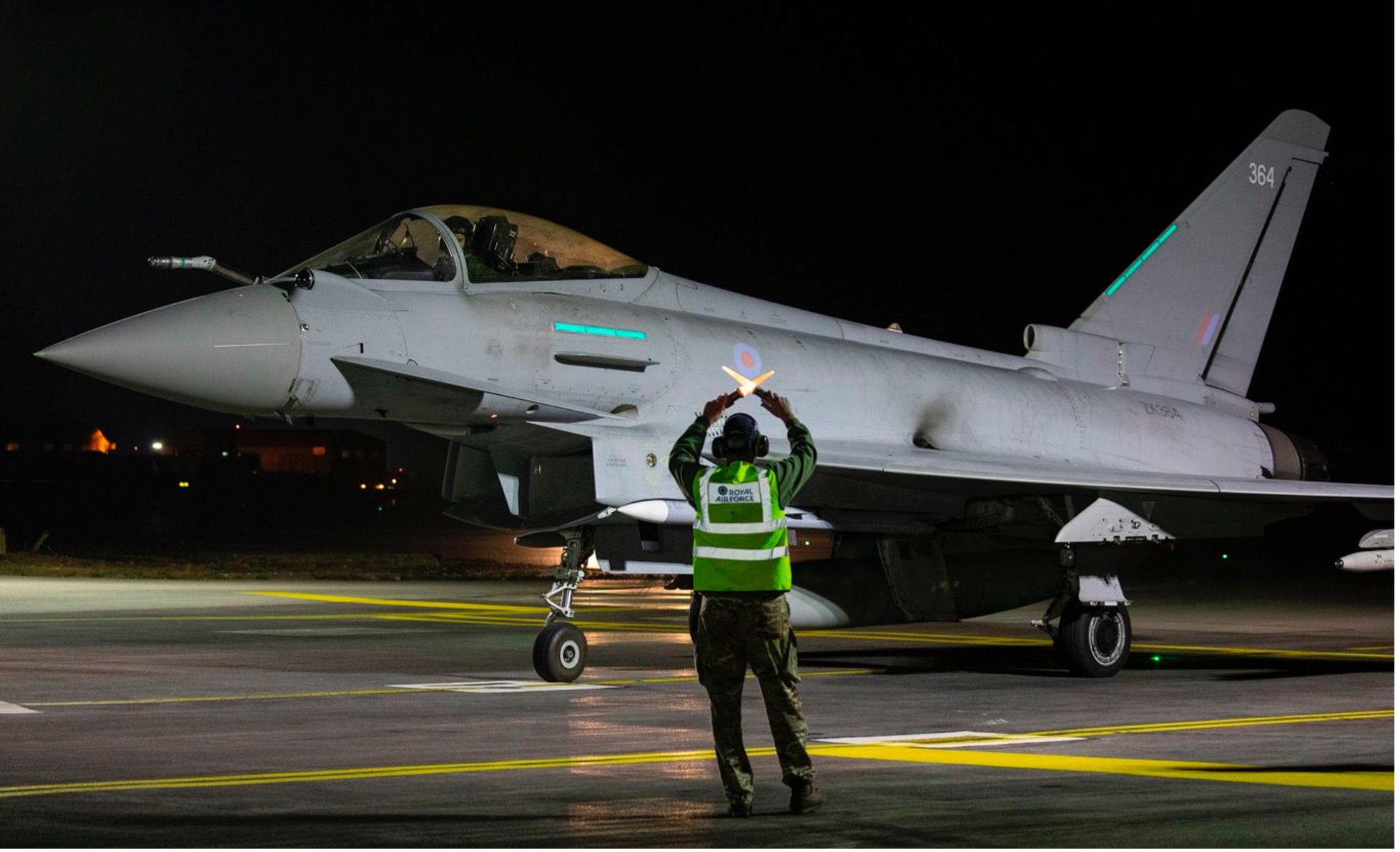In a UK Ministry of Defence story published on April 8, 2021, recent operations in Iraq by the RAF were highlighted.
A Daesh stronghold in northern Iraq has been cleared as part of Operation Shader, the Ministry of Defence has announced today. The RAF has carried out a series of air strikes working in support of the Iraqi Security Forces ground operations. Operation Shader remains essential to dismantling Daesh’s networks and reducing the terrorist group’s global ambitions.
In an operation lasting 10 days in March this year, the Iraqi Security Forces ground troops cleared Daesh terrorists from the Makhmur Mountain region, south-west from Erbil, while RAF and other coalition aircraft carried out a major air offensive.
The operation concluded on 22 March when Daesh extremists were confirmed to be based in a network of caves in the Makhmur mountains. Three Typhoon FGR4s were tasked to conduct an attack using Storm Shadow missiles, the remote area having first been checked to ensure that no civilians would be placed at risk.
The strike on the Daesh targets was assessed by subsequent surveillance to have been a success.
The Secretary of State for Defence said:
“The British Armed Forces, alongside our Iraqi and Coalition partners, continue to root out Daesh terrorists from where they hide.
“The UK is committed to defeating Daesh. This operation will prevent the terrorist group and its toxic ideology from regaining a foothold in Iraq and reduce its capability to coordinate attacks around the world.”
Throughout the 10 day operation, the RAF used Paveway IV bombs and Storm Shadow cruise missiles. This was the first operational use of the Storm Shadow cruise missile from a Typhoon FGR4 aircraft.
In a separate operation carried on Sunday 4 April, an RAF Reaper, armed with Hellfire missiles, identified a small group of Daesh terrorists in northern Syria, some fifty miles west of Al Hasakah. Having checked that there were no civilians nearby, the Reaper’s crew attacked the terrorists, striking the target successfully.
From 2019 – 2020, the Ministry of Defence estimates 67 Enemies Killed in Action and four Enemies Wounded in Action in Iraq and Syria under Operation Shader – the UK’s contribution to the Global Coalition against Daesh.
The operation carried out in March 2021 builds on the success of targeted air strikes to defeat Daesh in recent years and represents a significant increase in activity from previous months.
Air Commodore Simon Strasdin, Air Officer Commander of 83 Expeditionary Air Group and the UK Air Component Commander in the Middle East, said:
“The Royal Air Force and wider Coalition have supported an operation led by a highly capable unit from the Iraqi Security Forces. Together, we are working towards defeating the remnants of Daesh and ensuring its will is depleted.
“The commitment and dedication from the personnel deployed on operations across the Middle East is simply outstanding. It is even more impressive that the Royal Air Force can adapt and continue to deliver air power against the enemy during a global pandemic.”
Though Daesh has been territorially defeated, it is estimated there are approximately 10,000 Daesh terrorists still at large across Syria and Iraq. The UK, together with 81 partner nations of the Global
Coalition, therefore remains committed to working with Iraq to not only defeat Daesh but to also enhance security in the region.
In addition to air strikes the RAF is also delivering across a wide spectrum of air power including; Intelligence, Surveillance and Reconnaissance; Air to Air Refuelling and Air Transport; and the use of air assets such as Reaper, Voyager, C130 and A400Ms aircraft.
An RAF March 15, 2021 provided details on operations in March 2021.
Two RAF Typhoons were tasked to conduct a series of air strikes in support of Iraqi ground forces.
Royal Air Force Typhoons operating as part of the counter-Daesh Coalition have conducted a series of air strikes in support of Iraqi ground forces.
The strikes began on the Wednesday 10th March and carried on till Friday 12th March, with a follow on strike on Sunday 14th March. The targets were a caves system south west of the city of Erbil in Northern Iraq.
The strikes followed Iraqi forces identifying a significant number of Daesh terrorists using the cave complex. The series of caves which the terrorists were using were assessed to be a particularly difficult target, and two RAF Typhoons were therefore tasked to conduct an attack in support of the Iraqi forces.
UK Armed Forces are deployed to the Middle East to support counter Daesh operations as part of the 83-member strong Global Coalition.
The strikes on Wednesday saw the use of Storm Shadow missiles, which were selected as the most appropriate weapons for the task. A preceding check of the area confirmed that there were no signs of civilians in the area who might be placed at risk. Following the mission, the Typhoon’s weapons were confirmed to have struck their targets precisely.
Further surveillance efforts confirmed an additional two locations in the same area which were also being used by Daesh. Two Typhoons therefore conducted precision attacks on the extremists at both locations using six Paveway IV guided bombs. The following day, further strikes were carried out when Typhoons struck yet another group of caves used by Daesh, with eight Paveway IV bombs. On Sunday, a further six Paveway IVs were employed against more Daesh-held caves in the same remote, mountainous area.








